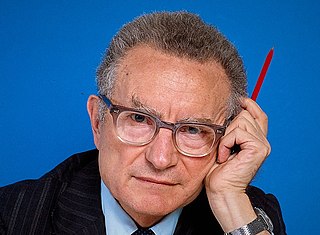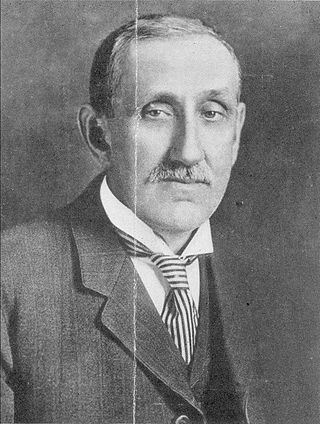
Economics is a social science that studies the production, distribution, and consumption of goods and services.

Economic history is the study of history using methodological tools from economics or with a special attention to economic phenomena. Research is conducted using a combination of historical methods, statistical methods and the application of economic theory to historical situations and institutions. The field can encompass a wide variety of topics, including equality, finance, technology, labour, and business. It emphasizes historicizing the economy itself, analyzing it as a dynamic entity and attempting to provide insights into the way it is structured and conceived.
New Keynesian economics is a school of macroeconomics that strives to provide microeconomic foundations for Keynesian economics. It developed partly as a response to criticisms of Keynesian macroeconomics by adherents of new classical macroeconomics.

Thorstein Bunde Veblen was an American economist and sociologist who, during his lifetime, emerged as a well-known critic of capitalism.

In sociology and in economics, the term conspicuous consumption describes and explains the consumer practice of buying and using goods of a higher quality, price, or in greater quantity than practical. In 1899, the sociologist Thorstein Veblen coined the term conspicuous consumption to explain the spending of money on and the acquiring of luxury commodities specifically as a public display of economic power—the income and the accumulated wealth—of the buyer. To the conspicuous consumer, the public display of discretionary income is an economic means of either attaining or maintaining a given social status.

Paul Anthony Samuelson was an American economist who was the first American to win the Nobel Memorial Prize in Economic Sciences. When awarding the prize in 1970, the Swedish Royal Academies stated that he "has done more than any other contemporary economist to raise the level of scientific analysis in economic theory".

Economic inequality is an umbrella term for a) income inequality or distribution of income, b) wealth inequality or distribution of wealth, and c) consumption inequality. Each of these can be measured between two or more nations, within a single nation, or between and within sub-populations.

A Veblen good is a type of luxury good, named after American economist Thorstein Veblen, for which the demand increases as the price increases, in apparent contradiction of the law of demand, resulting in an upward-sloping demand curve. The higher prices of Veblen goods may make them desirable as a status symbol in the practices of conspicuous consumption and conspicuous leisure. A product may be a Veblen good because it is a positional good, something few others can own.

Antoine Augustin Cournot was a French philosopher and mathematician who contributed to the development of economics.

Juliet B. Schor is an American economist and Sociology Professor at Boston College. She has studied trends in working time, consumerism, the relationship between work and family, women's issues and economic inequality, and concerns about climate change in the environment. From 2010 to 2017, she studied the sharing economy under a large research project funded by the MacArthur Foundation. She is currently working on a project titled "The Algorithmic Workplace" with a grant from the National Science Foundation.

The permanent income hypothesis (PIH) is a model in the field of economics to explain the formation of consumption patterns. It suggests consumption patterns are formed from future expectations and consumption smoothing. The theory was developed by Milton Friedman and published in his A Theory of the Consumption Function, published in 1957 and subsequently formalized by Robert Hall in a rational expectations model. Originally applied to consumption and income, the process of future expectations is thought to influence other phenomena. In its simplest form, the hypothesis states changes in permanent income, rather than changes in temporary income, are what drive changes in consumption.

Property rights are constructs in economics for determining how a resource or economic good is used and owned, which have developed over ancient and modern history, from Abrahamic law to Article 17 of the Universal Declaration of Human Rights. Resources can be owned by individuals, associations, collectives, or governments.
The economics of religion concerns both the application of the techniques of economics to the study of religion and the relationship between economic and religious behaviours. Contemporary writers on the subject trace it back to Adam Smith (1776).

Simon Nelson Patten was an American economist and the chair of the Wharton School of Business at the University of Pennsylvania. Patten was one of the first economists to posit a shift from an 'economics of scarcity' to an 'economics of abundance'; that is, he believed that soon there would be enough wealth to satisfy people's basic needs and that the economy would shift from an emphasis on production to consumption.

Redistribution of income and wealth is the transfer of income and wealth from some individuals to others through a social mechanism such as taxation, welfare, public services, land reform, monetary policies, confiscation, divorce or tort law. The term typically refers to redistribution on an economy-wide basis rather than between selected individuals.

Thomas Nixon Carver was an American economics professor.
Precautionary saving is saving that occurs in response to uncertainty regarding future income. The precautionary motive to delay consumption and save in the current period rises due to the lack of completeness of insurance markets. Accordingly, individuals will not be able to insure against some bad state of the economy in the future. They anticipate that if this bad state is realized, they will earn lower income. To avoid adverse effects of future income fluctuations and retain a smooth path of consumption, they set aside a precautionary reserve, called precautionary savings, by consuming less in the current period, and resort to it in case the bad state is realized in the future.
Optimal capital income taxation is a subarea of optimal tax theory which studies the design of taxes on capital income such that a given economic criterion like utility is optimized.
Joseph Gerard Altonji is an American economist and the Thomas DeWitt Cuyler Professor of Economics at Yale University. His fields of interest include macroeconomics and applied econometrics and in particular labour economics, being ranked as one of the foremost labour economists worldwide. In 2018, his contributions to the analysis of labour supply, family economics and discrimination were rewarded with the IZA Prize in Labor Economics.
Sydney C. Ludvigson is an American economist and the Julius Silver, Roslyn S. Silver, and Enid Silver Winslow Professor of Economics at New York University. Since 2017, she serves as chair of NYU's economics department.












